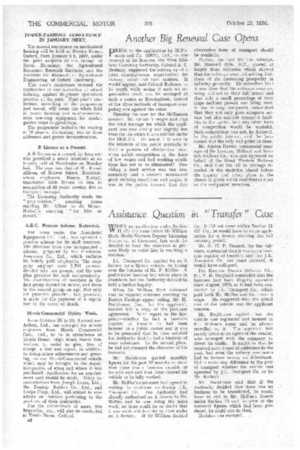Assistance Question in " Transfer" Case
Page 40

If you've noticed an error in this article please click here to report it so we can fix it.
WHEN an application under Section W 11 (3) (b) came before Sir William Hart, North-Western Deputy Licensing Authority, at Liverpool, last week, he decided to hear the objectors as persons likely to assist him in reaching a decision.
J.L. Transport Co. applied for an A licence for a 2i-ton vehicle, on taking over the business of Mr. P. MeNee. A preliminary hearing had taken place in chambers, but the Authority decided to hold a further inquiry.
When Sir William Hatt indicated that he required evidence covering the Boston Haulage appeal ruling, Mr. H. Backhouse, Jun., for the applicant, handed him a copy of the purchase agreement. With regard to the first point—whether he had a business capable of transfer—he had been licensed as a public carrier and it was to be presumed that he then satisfied the Authority that he had a business of some substance. In the second place, he had not changed the character of his business,
Mr. 13ackhouse quoted monthly figures for the past 12 months to show that there was a business capable of transfer and said that these showed his vehicle to be fully worked.
Mr. McNees customers had agreed in writing to continue employing J.L. Transport Co. The Authority had already authorized an A licence to Mr. MeNee and he was doing the same work, so there could be no doubt that it was work which could be done under an A licence. If Sir.William decided
that it did not come within section 11 (3) (b), he would have to make application for a licence covering the full currency period.
Mr. G. .H. P. BeameS, for the railways, contended that it was not a business capable of transfer, and had J.L. Transport Co. not come forward, it would have collapsed.
For Karriers Parcels Delivery Co., Mr. V. R. Shepherd contended that the business had been illegally operated since August, 1935, as it had been conducted by J.L. Transport Co„ which paid both Mr. Mcalee and his driver a. wage. He suggested that the actual user of the vehicle was the applicant concern.
Mr. Backhause replied that the vehicle was registered and insured in Mr. MeNee's name and he always travelled on it. The applicant had merely acted as an agent of the vendor, who arranged with the company to direct his traffic. It might be that he received some financial assistance in the past, but even the railway companies had to borrow money on debentures. Did it make any difference to the pool of transport whether the vehicle was operated by J.L. Transport Co. or by Mr. McNee?
Mr. Backhouse said that if the Authority decided that there was no business to be transferred, he would have to call in. Mr. McNee's licence under Section 15 and, in view of the turnover figures which had been produced, he could not do that.
Decision was reserved.




























































































